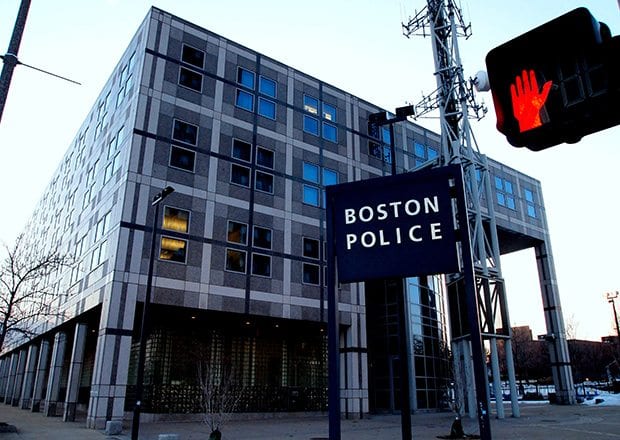MCAD finds bias in BPD Academy
Hearing finds officers showed bias in dismissal of black recruit

In a stinging rebuke of the Boston Police Department, the Massachusetts Commission Against Discrimination found that its training academy violated the rights of a black recruit who was expelled from the academy for cheating while white recruits who were accused of public drunkenness, brawling and other offenses were allowed to graduate.
In addition to ordering recruit Claude Defay to be reinstated and compensated for emotional distress damages, hearing officer Betty Waxman ordered the department to “Cease and desist from the disparate treatment of recruits based on race in the imposition of penalties for Training Academy violations.”
“I’m extremely happy with the decision,” Defay told the Banner. “This has been a long, drawn-out process.”
Defay was represented by the Lawyers Committee for Civil Rights and Equal Justice Under Law and the law firm Wilmer Hale.
Boston Police spokesman Lt. Mike McCarthy said the department is disappointed with the MCAD ruling.
“The decision by the MCAD confirms that Mr. Defay was untruthful and dishonest during his training at the academy,” McCarthy wrote in an email to the Banner. “Integrity and honesty are two of the most important traits we expect our police officers to possess. We are disappointed that the MCAD doesn’t feel a strongly as we do on this issue.”
Dream deferred
A lifelong Dorchester resident, Defay said he has always wanted to work in law enforcement. While working as a budget analyst at Deutsche Bank in 2009, Defay took the civil service exam for the police department and was accepted into the academy in April of 2010.
“I was in financial services for six years, but I knew deep down my passion was to be in law enforcement,” he said.
Defay’s alleged violation of Police Academy regulations occurred during an exam.
According to the department, fellow recruit Boris Vragovic told supervisors Defay repeatedly questioned him about a specific question on his test during a bathroom break. Cheating on an exam is considered a class 1 offense in the academy’s Recruit Training Manual, along with infractions like lying and conduct unbecoming of an officer.
But while Defay was dismissed from the academy, other officers who engaged in similar class 1 violations of the department code were not terminated or were cited for lesser violations.
“There was definitely disparate treatment between minorities and whites,” he said. “That was clear to everybody’s eye.”
Larry Ellison, president of the Massachusetts Association of Minority Law Enforcement Officials, said his organization has received numerous complaints of disparate treatment of recruits and applicants to the Police Academy.
“We’re getting more and more of these complaints coming to us about how people of color are treated in the academy,” he said. “Many black recruits are being dismissed for violations for which whites are not being dismissed.”
In his complaint, Defay pointed to two recruits, identified as Bernazzani and Conley, who only received written warnings after an altercation outside of a pub that left Bernazzani with a black eye and six stitches and Conley with a bruised fist.
In responding the allegations of disparate treatment, the department argued that Bernazzani and Conley did not commit a class 1 violation because they were just “horsing around,” even though the recruits gave conflicting accounts of the incident in their oral and written reports.
In another case, recruit George Flaherty, who is white, received an oral warning for drunkenly addressing a Boston police officer in public — an act Waxman cited as an “apparent violation of Rule 1-11, which makes it a class 1 offense to engage in off-duty use of alcohol sufficient to discredit the academy.” Three weeks later, Flaherty ran a red light while driving 60 miles an hour in a 40-mile-an-hour zone. He received a written warning, although academy rules provide for dismissal for a class 1 or 2 offense following imposition of a prior warning.
Righting wrongs
Other black recruits cited in the MCAD decision were doled out more severe punishments than the white officers. Among those cited in Waxman’s decision, Domingos Rosa was dismissed from the academy for untruthfulness after he reported that a superior told him he did not have to bring all of his uniforms to class.
“The adverse action sustained by the Complainant — dismissal for an alleged integrity class 1 violation — was imposed only on the Complainant and one other Class 49-10 recruit who was also a candidate of color whereas white recruits received lesser discipline for their infractions,” Waxman wrote.
Waxman’s decision orders the department to pay Defay $40,000 in emotional distress damages, to reinstate Defay to the next Recruit Training Academy class with credit for completing the academic portion of the course and, if he completes all training requirements, to “pay Defay back pay damages consisting of the differential, if any, between what he would have earned as a recruit officer who graduated from the December, 2011 academy class and what he actually earned since his March, 2011 dismissal.”
Lawyers Committee Executive Director Ivan Espinoza-Madrigal said the MCAD ruling is an important step in helping to ensure a diverse police force.
“Diversity in police ranks is a key component of community representation and accountability,” he said. “Our communities are safer and stronger when minority police officers are given equal opportunities to join the force and advance and when police departments reflect the neighborhoods they serve.”
The Boston Police Department has ten days to appeal the decision before the MCAD. The department also can appeal the decision in the state’s Superior Court.
“At this point the decision is being reviewed by the legal office to determine next steps,” Lt. McCarthy wrote in his email.







